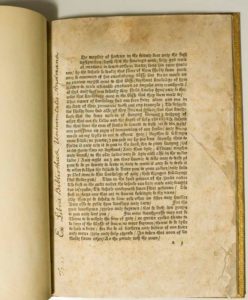Propose an Edition
We welcome proposals for editions of Middle English texts from both established scholars and early career researchers, and particularly encourage enquiries from recently completed doctoral students.
The initial proposal should take the form of a Word document (maximum 1,000 words). It should give details of the Middle English text(s) to be edited and should make the case for the proposed edition, offering a brief outline of what the edition will include. There is no need to include sample pages at this stage.
The proposal should be sent to either of the general editors.
A MET volume is first accepted for publication ‘in principle’, and negotiation between the editor and the General Editors remains informal. One of the General Editors will work closely (as a supervising editor) with the volume editor, offering advice and help as required, at all stages. An author contract is not normally issued, but we provide a letter setting out the terms and conditions for publication. No royalties are paid, but the volume editor will receive 15 copies of the book, free of charge.
MET Format
MET volumes are normally 150–200 pages in length, and commonly conform to the pattern of: Introduction, Text, Apparatus, Commentary, Glossary, Bibliography. They have a textual bias. The Introduction will include a description of the manuscript(s), their relationships, and the editorial policies adopted for the edition, as well as discussion of other relevant aspects of the text (content, sources, provenance, language, date, etc.). The Text will be accompanied by a critical apparatus. Where the edited text is translated from a source, editors are encouraged to include the source text either as a parallel text on the facing page or at the bottom of the page, especially if the source text is obscure or unpublished. It is not always possible or necessary to include the source text where it is well known and easily available. The Commentary should discuss matters both of text and content and provide evidence and arguments for emendations. The Glossary is usually selective. Editorial policy will vary according to the needs of the text and the interests of the editor.
Stylesheet
Detailed guidance on preparing a text for MET may be found in our Notes for Editors. Guidelines_for_Editors
Submission of Final Copy
When agreement is reached on the final form of the volume, it is the editor’s responsibility to prepare, or have prepared, a camera-ready-copy for the use of the publishers. The General Editors will give advice on producing this copy. The sophistication of current software means that it is possible to produce pages of a high standard; this has meant that the general editors have become more closely involved in the design of the pages. When the camera-ready version is ready for the publishers, the editor should first send a complete copy to the General Editor who has been assigned to oversee the volume, that is, the ‘supervising general editor’. At the next stage, the other General Editors will be invited to comment on the volume. Editors will then receive instructions for final submission. It has become customary for the supervising general editor to send the completed volume in camera-ready copy (hard copy) to the publishers so that they can highlight any special instructions for the ordering and presentation of the edition. Publication will normally follow within a few months.
For further guidelines, see attached examples of glossaries and introductions.
For more information about the Middle English Texts series contact any of the general editors:
Margaret Connolly: [email protected]
William Marx: [email protected]
